Analyzing Ideology and State Building in Crisis-Hit Iraq
VerifiedAdded on 2023/04/24
|9
|2926
|323
Essay
AI Summary
This essay examines the influence of various ideologies on the state building program in Iraq, a nation facing severe political crisis and instability. It discusses how conservative religious ideologies, particularly those held by the ruling Shiite Arab majority, clash with the ideologies of minority sections, contributing to the ongoing turmoil. The essay also explores the roles of external actors, such as the United States, Canada, and the United Kingdom, in the state building process, driven by ideologies like peacekeeping, predatory theory (war making), protection, and state making. It argues that while peacekeeping is often cited as the primary motive for intervention, factors such as gaining control over oil resources and eliminating rival nations also play significant roles. Ultimately, the essay highlights the complex interplay of ideologies shaping the state building efforts in Iraq and the motivations behind international involvement.
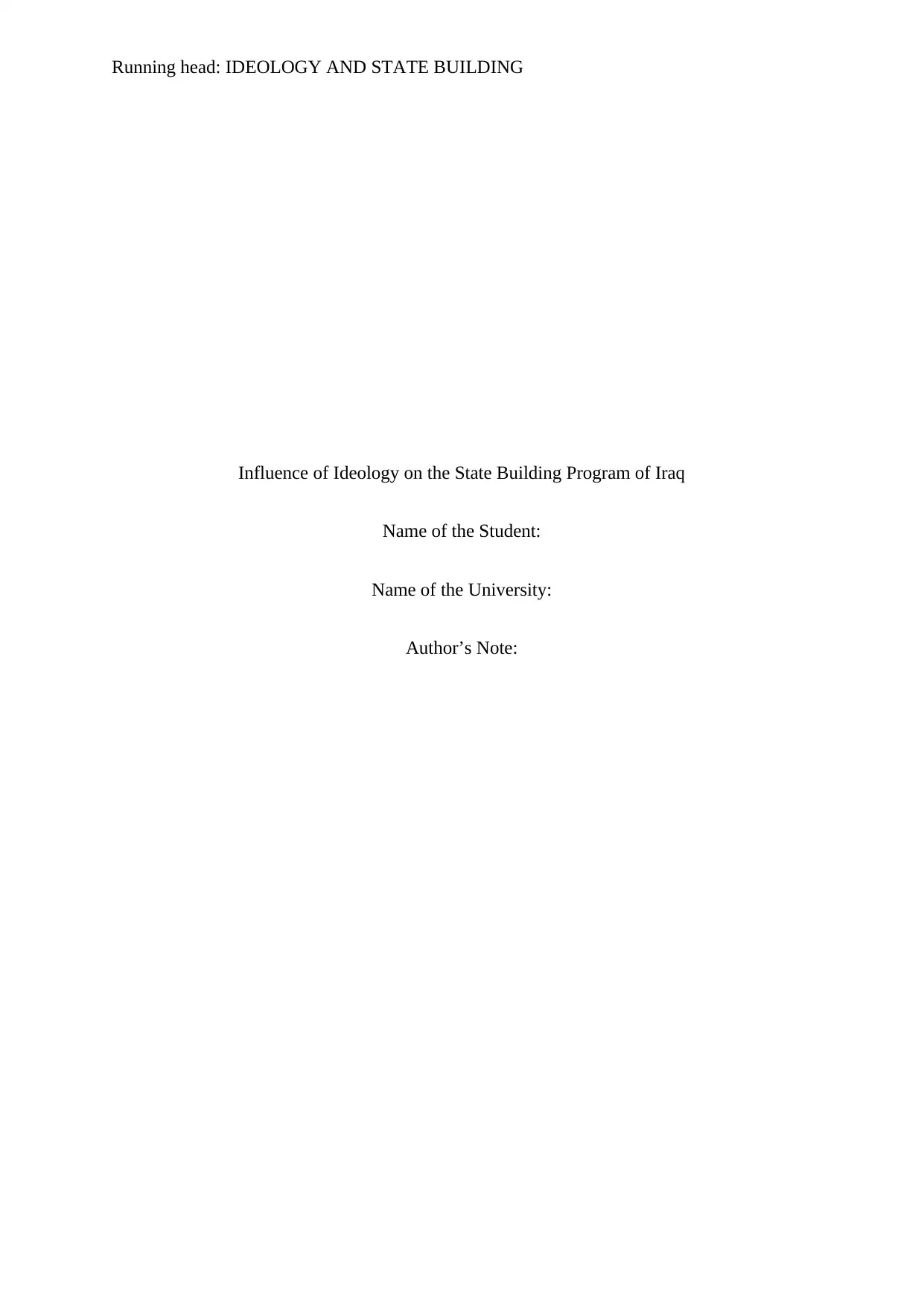
Running head: IDEOLOGY AND STATE BUILDING
Influence of Ideology on the State Building Program of Iraq
Name of the Student:
Name of the University:
Author’s Note:
Influence of Ideology on the State Building Program of Iraq
Name of the Student:
Name of the University:
Author’s Note:
Paraphrase This Document
Need a fresh take? Get an instant paraphrase of this document with our AI Paraphraser
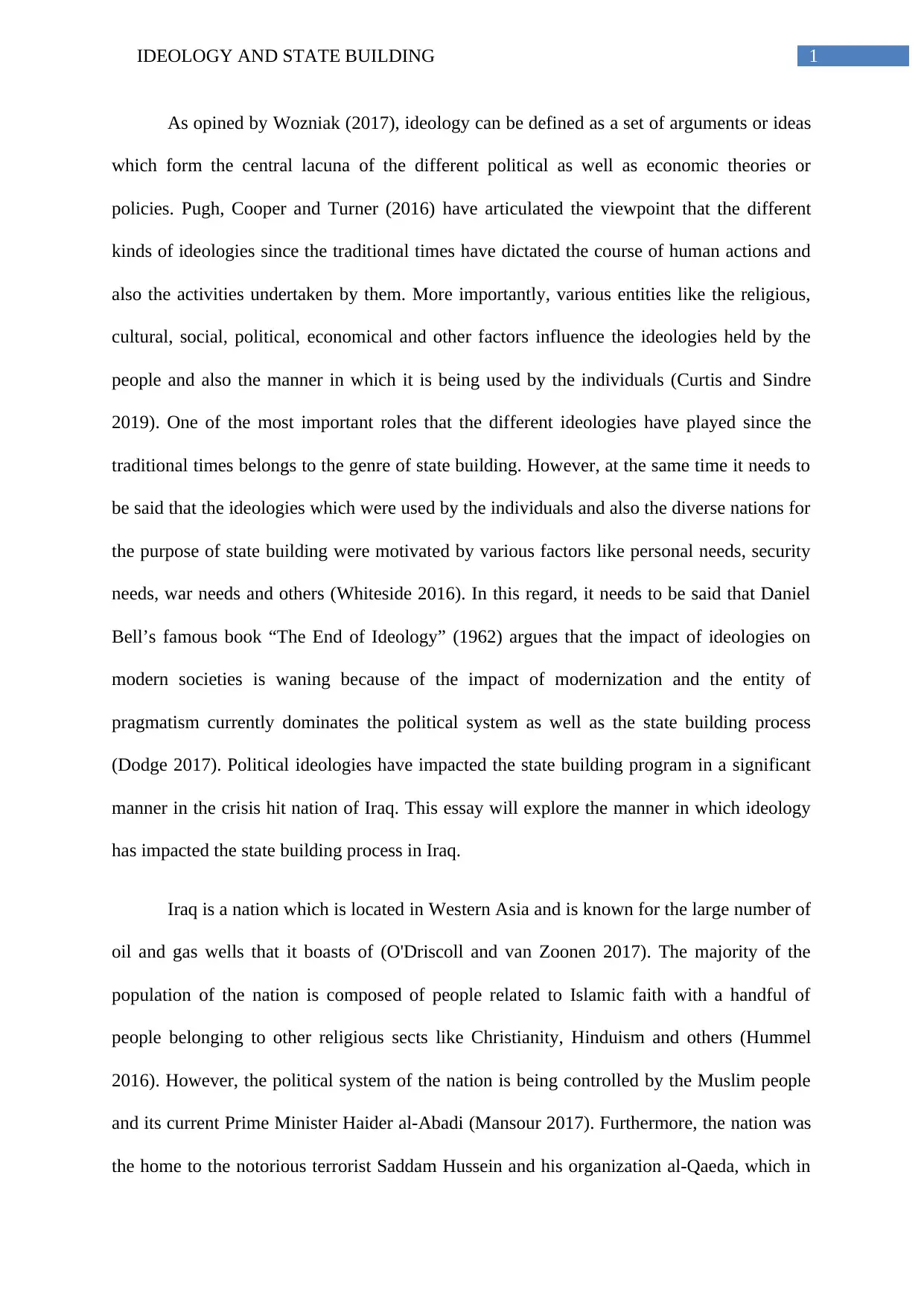
1IDEOLOGY AND STATE BUILDING
As opined by Wozniak (2017), ideology can be defined as a set of arguments or ideas
which form the central lacuna of the different political as well as economic theories or
policies. Pugh, Cooper and Turner (2016) have articulated the viewpoint that the different
kinds of ideologies since the traditional times have dictated the course of human actions and
also the activities undertaken by them. More importantly, various entities like the religious,
cultural, social, political, economical and other factors influence the ideologies held by the
people and also the manner in which it is being used by the individuals (Curtis and Sindre
2019). One of the most important roles that the different ideologies have played since the
traditional times belongs to the genre of state building. However, at the same time it needs to
be said that the ideologies which were used by the individuals and also the diverse nations for
the purpose of state building were motivated by various factors like personal needs, security
needs, war needs and others (Whiteside 2016). In this regard, it needs to be said that Daniel
Bell’s famous book “The End of Ideology” (1962) argues that the impact of ideologies on
modern societies is waning because of the impact of modernization and the entity of
pragmatism currently dominates the political system as well as the state building process
(Dodge 2017). Political ideologies have impacted the state building program in a significant
manner in the crisis hit nation of Iraq. This essay will explore the manner in which ideology
has impacted the state building process in Iraq.
Iraq is a nation which is located in Western Asia and is known for the large number of
oil and gas wells that it boasts of (O'Driscoll and van Zoonen 2017). The majority of the
population of the nation is composed of people related to Islamic faith with a handful of
people belonging to other religious sects like Christianity, Hinduism and others (Hummel
2016). However, the political system of the nation is being controlled by the Muslim people
and its current Prime Minister Haider al-Abadi (Mansour 2017). Furthermore, the nation was
the home to the notorious terrorist Saddam Hussein and his organization al-Qaeda, which in
As opined by Wozniak (2017), ideology can be defined as a set of arguments or ideas
which form the central lacuna of the different political as well as economic theories or
policies. Pugh, Cooper and Turner (2016) have articulated the viewpoint that the different
kinds of ideologies since the traditional times have dictated the course of human actions and
also the activities undertaken by them. More importantly, various entities like the religious,
cultural, social, political, economical and other factors influence the ideologies held by the
people and also the manner in which it is being used by the individuals (Curtis and Sindre
2019). One of the most important roles that the different ideologies have played since the
traditional times belongs to the genre of state building. However, at the same time it needs to
be said that the ideologies which were used by the individuals and also the diverse nations for
the purpose of state building were motivated by various factors like personal needs, security
needs, war needs and others (Whiteside 2016). In this regard, it needs to be said that Daniel
Bell’s famous book “The End of Ideology” (1962) argues that the impact of ideologies on
modern societies is waning because of the impact of modernization and the entity of
pragmatism currently dominates the political system as well as the state building process
(Dodge 2017). Political ideologies have impacted the state building program in a significant
manner in the crisis hit nation of Iraq. This essay will explore the manner in which ideology
has impacted the state building process in Iraq.
Iraq is a nation which is located in Western Asia and is known for the large number of
oil and gas wells that it boasts of (O'Driscoll and van Zoonen 2017). The majority of the
population of the nation is composed of people related to Islamic faith with a handful of
people belonging to other religious sects like Christianity, Hinduism and others (Hummel
2016). However, the political system of the nation is being controlled by the Muslim people
and its current Prime Minister Haider al-Abadi (Mansour 2017). Furthermore, the nation was
the home to the notorious terrorist Saddam Hussein and his organization al-Qaeda, which in
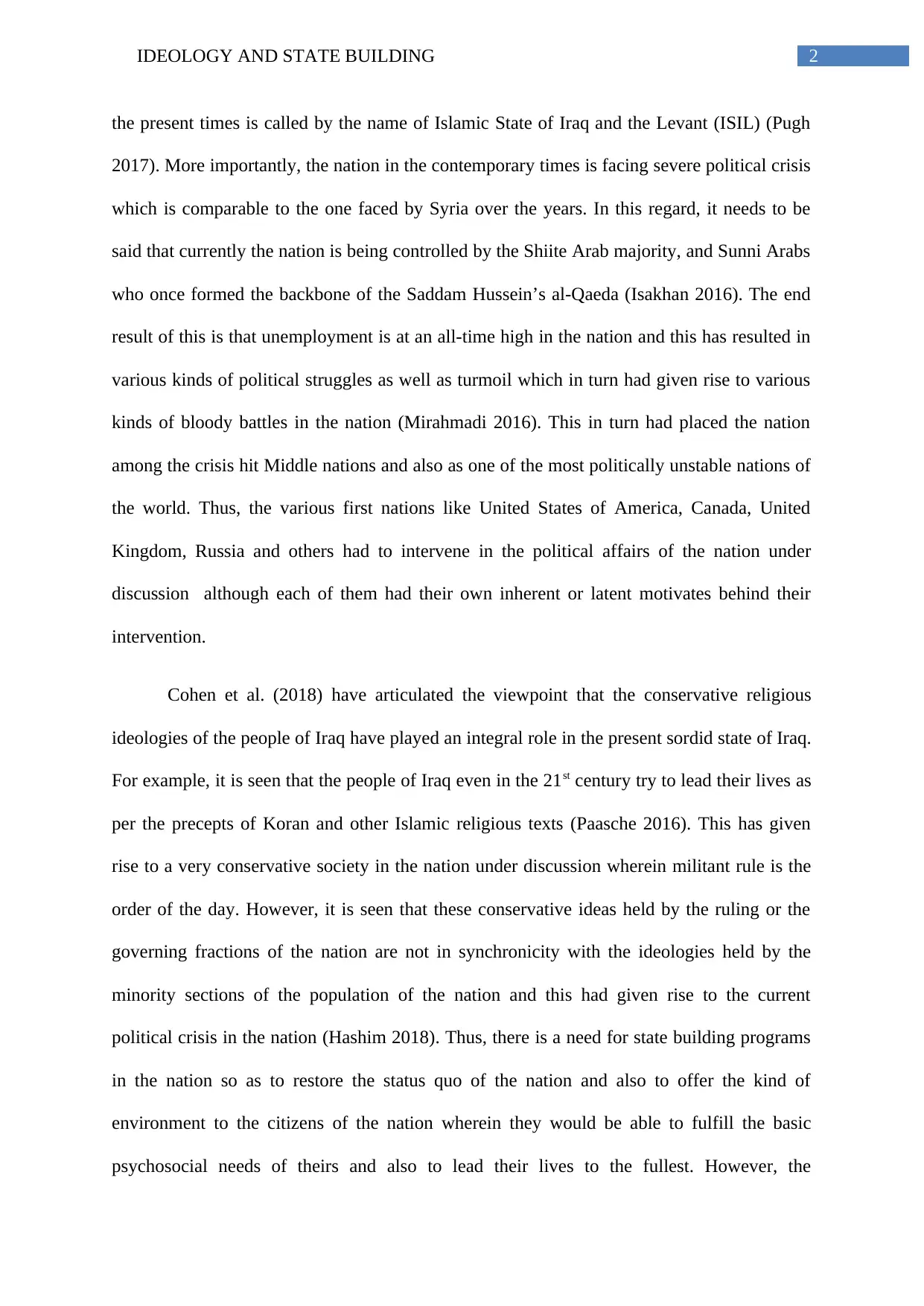
2IDEOLOGY AND STATE BUILDING
the present times is called by the name of Islamic State of Iraq and the Levant (ISIL) (Pugh
2017). More importantly, the nation in the contemporary times is facing severe political crisis
which is comparable to the one faced by Syria over the years. In this regard, it needs to be
said that currently the nation is being controlled by the Shiite Arab majority, and Sunni Arabs
who once formed the backbone of the Saddam Hussein’s al-Qaeda (Isakhan 2016). The end
result of this is that unemployment is at an all-time high in the nation and this has resulted in
various kinds of political struggles as well as turmoil which in turn had given rise to various
kinds of bloody battles in the nation (Mirahmadi 2016). This in turn had placed the nation
among the crisis hit Middle nations and also as one of the most politically unstable nations of
the world. Thus, the various first nations like United States of America, Canada, United
Kingdom, Russia and others had to intervene in the political affairs of the nation under
discussion although each of them had their own inherent or latent motivates behind their
intervention.
Cohen et al. (2018) have articulated the viewpoint that the conservative religious
ideologies of the people of Iraq have played an integral role in the present sordid state of Iraq.
For example, it is seen that the people of Iraq even in the 21st century try to lead their lives as
per the precepts of Koran and other Islamic religious texts (Paasche 2016). This has given
rise to a very conservative society in the nation under discussion wherein militant rule is the
order of the day. However, it is seen that these conservative ideas held by the ruling or the
governing fractions of the nation are not in synchronicity with the ideologies held by the
minority sections of the population of the nation and this had given rise to the current
political crisis in the nation (Hashim 2018). Thus, there is a need for state building programs
in the nation so as to restore the status quo of the nation and also to offer the kind of
environment to the citizens of the nation wherein they would be able to fulfill the basic
psychosocial needs of theirs and also to lead their lives to the fullest. However, the
the present times is called by the name of Islamic State of Iraq and the Levant (ISIL) (Pugh
2017). More importantly, the nation in the contemporary times is facing severe political crisis
which is comparable to the one faced by Syria over the years. In this regard, it needs to be
said that currently the nation is being controlled by the Shiite Arab majority, and Sunni Arabs
who once formed the backbone of the Saddam Hussein’s al-Qaeda (Isakhan 2016). The end
result of this is that unemployment is at an all-time high in the nation and this has resulted in
various kinds of political struggles as well as turmoil which in turn had given rise to various
kinds of bloody battles in the nation (Mirahmadi 2016). This in turn had placed the nation
among the crisis hit Middle nations and also as one of the most politically unstable nations of
the world. Thus, the various first nations like United States of America, Canada, United
Kingdom, Russia and others had to intervene in the political affairs of the nation under
discussion although each of them had their own inherent or latent motivates behind their
intervention.
Cohen et al. (2018) have articulated the viewpoint that the conservative religious
ideologies of the people of Iraq have played an integral role in the present sordid state of Iraq.
For example, it is seen that the people of Iraq even in the 21st century try to lead their lives as
per the precepts of Koran and other Islamic religious texts (Paasche 2016). This has given
rise to a very conservative society in the nation under discussion wherein militant rule is the
order of the day. However, it is seen that these conservative ideas held by the ruling or the
governing fractions of the nation are not in synchronicity with the ideologies held by the
minority sections of the population of the nation and this had given rise to the current
political crisis in the nation (Hashim 2018). Thus, there is a need for state building programs
in the nation so as to restore the status quo of the nation and also to offer the kind of
environment to the citizens of the nation wherein they would be able to fulfill the basic
psychosocial needs of theirs and also to lead their lives to the fullest. However, the
⊘ This is a preview!⊘
Do you want full access?
Subscribe today to unlock all pages.

Trusted by 1+ million students worldwide
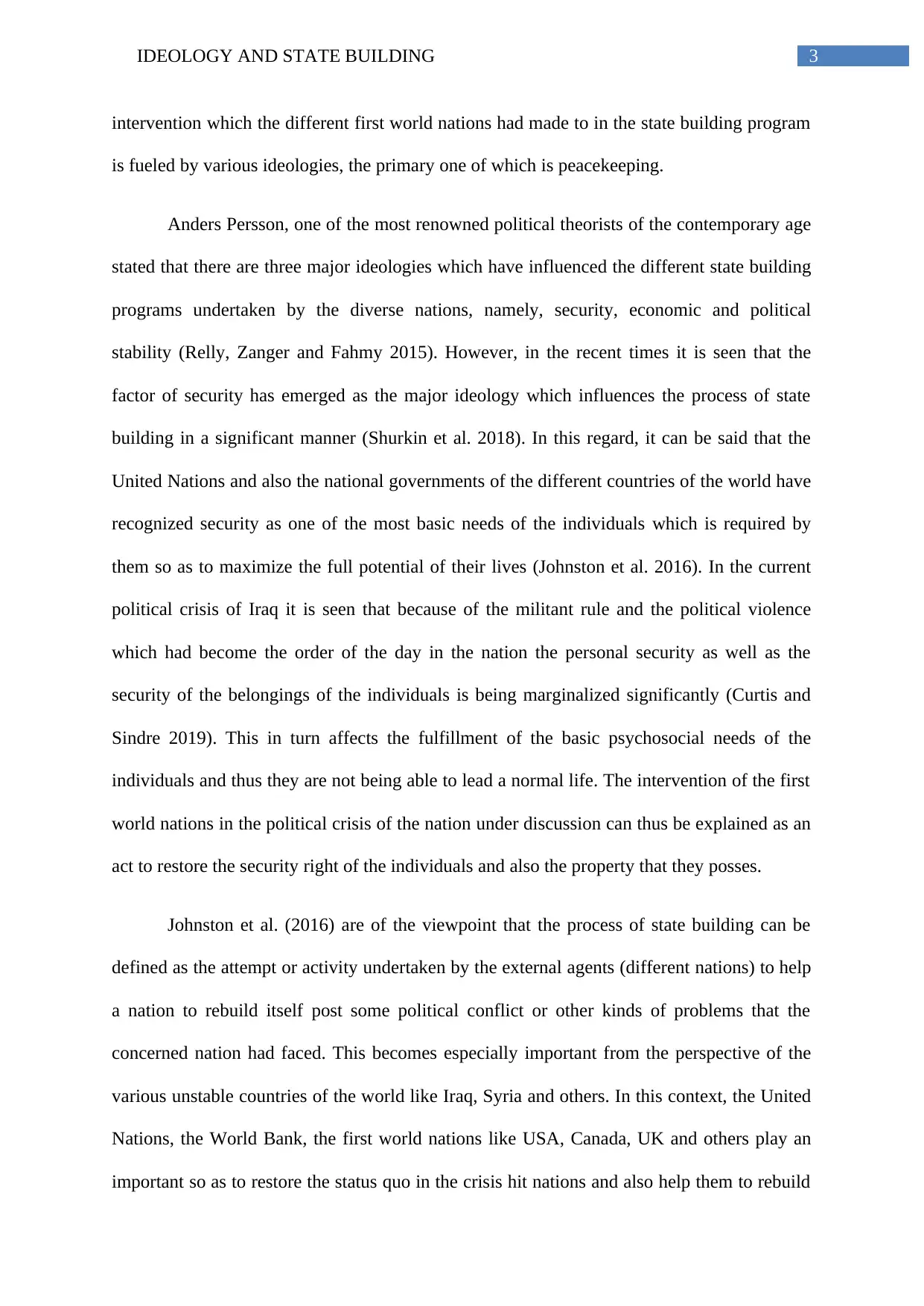
3IDEOLOGY AND STATE BUILDING
intervention which the different first world nations had made to in the state building program
is fueled by various ideologies, the primary one of which is peacekeeping.
Anders Persson, one of the most renowned political theorists of the contemporary age
stated that there are three major ideologies which have influenced the different state building
programs undertaken by the diverse nations, namely, security, economic and political
stability (Relly, Zanger and Fahmy 2015). However, in the recent times it is seen that the
factor of security has emerged as the major ideology which influences the process of state
building in a significant manner (Shurkin et al. 2018). In this regard, it can be said that the
United Nations and also the national governments of the different countries of the world have
recognized security as one of the most basic needs of the individuals which is required by
them so as to maximize the full potential of their lives (Johnston et al. 2016). In the current
political crisis of Iraq it is seen that because of the militant rule and the political violence
which had become the order of the day in the nation the personal security as well as the
security of the belongings of the individuals is being marginalized significantly (Curtis and
Sindre 2019). This in turn affects the fulfillment of the basic psychosocial needs of the
individuals and thus they are not being able to lead a normal life. The intervention of the first
world nations in the political crisis of the nation under discussion can thus be explained as an
act to restore the security right of the individuals and also the property that they posses.
Johnston et al. (2016) are of the viewpoint that the process of state building can be
defined as the attempt or activity undertaken by the external agents (different nations) to help
a nation to rebuild itself post some political conflict or other kinds of problems that the
concerned nation had faced. This becomes especially important from the perspective of the
various unstable countries of the world like Iraq, Syria and others. In this context, the United
Nations, the World Bank, the first world nations like USA, Canada, UK and others play an
important so as to restore the status quo in the crisis hit nations and also help them to rebuild
intervention which the different first world nations had made to in the state building program
is fueled by various ideologies, the primary one of which is peacekeeping.
Anders Persson, one of the most renowned political theorists of the contemporary age
stated that there are three major ideologies which have influenced the different state building
programs undertaken by the diverse nations, namely, security, economic and political
stability (Relly, Zanger and Fahmy 2015). However, in the recent times it is seen that the
factor of security has emerged as the major ideology which influences the process of state
building in a significant manner (Shurkin et al. 2018). In this regard, it can be said that the
United Nations and also the national governments of the different countries of the world have
recognized security as one of the most basic needs of the individuals which is required by
them so as to maximize the full potential of their lives (Johnston et al. 2016). In the current
political crisis of Iraq it is seen that because of the militant rule and the political violence
which had become the order of the day in the nation the personal security as well as the
security of the belongings of the individuals is being marginalized significantly (Curtis and
Sindre 2019). This in turn affects the fulfillment of the basic psychosocial needs of the
individuals and thus they are not being able to lead a normal life. The intervention of the first
world nations in the political crisis of the nation under discussion can thus be explained as an
act to restore the security right of the individuals and also the property that they posses.
Johnston et al. (2016) are of the viewpoint that the process of state building can be
defined as the attempt or activity undertaken by the external agents (different nations) to help
a nation to rebuild itself post some political conflict or other kinds of problems that the
concerned nation had faced. This becomes especially important from the perspective of the
various unstable countries of the world like Iraq, Syria and others. In this context, the United
Nations, the World Bank, the first world nations like USA, Canada, UK and others play an
important so as to restore the status quo in the crisis hit nations and also help them to rebuild
Paraphrase This Document
Need a fresh take? Get an instant paraphrase of this document with our AI Paraphraser
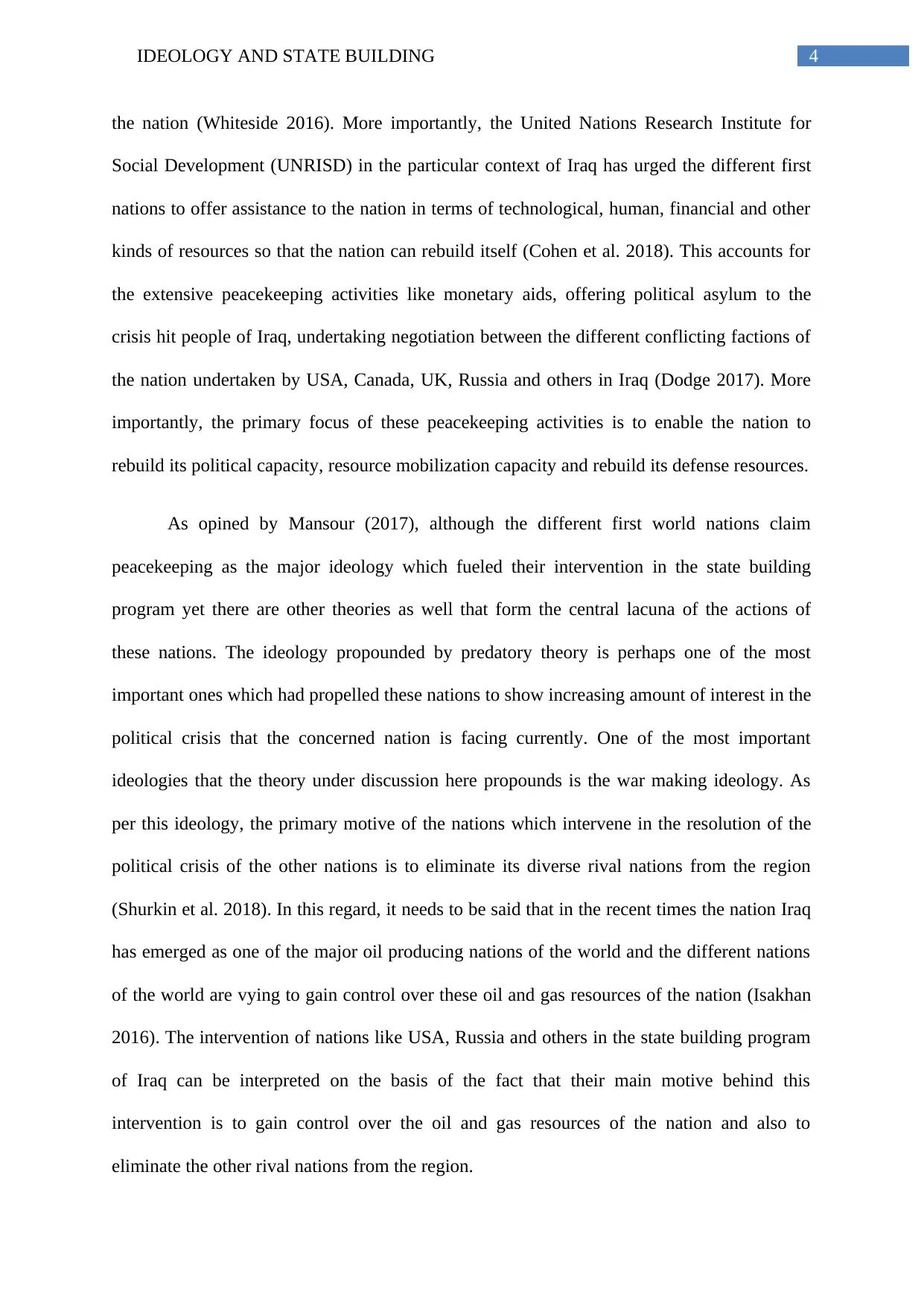
4IDEOLOGY AND STATE BUILDING
the nation (Whiteside 2016). More importantly, the United Nations Research Institute for
Social Development (UNRISD) in the particular context of Iraq has urged the different first
nations to offer assistance to the nation in terms of technological, human, financial and other
kinds of resources so that the nation can rebuild itself (Cohen et al. 2018). This accounts for
the extensive peacekeeping activities like monetary aids, offering political asylum to the
crisis hit people of Iraq, undertaking negotiation between the different conflicting factions of
the nation undertaken by USA, Canada, UK, Russia and others in Iraq (Dodge 2017). More
importantly, the primary focus of these peacekeeping activities is to enable the nation to
rebuild its political capacity, resource mobilization capacity and rebuild its defense resources.
As opined by Mansour (2017), although the different first world nations claim
peacekeeping as the major ideology which fueled their intervention in the state building
program yet there are other theories as well that form the central lacuna of the actions of
these nations. The ideology propounded by predatory theory is perhaps one of the most
important ones which had propelled these nations to show increasing amount of interest in the
political crisis that the concerned nation is facing currently. One of the most important
ideologies that the theory under discussion here propounds is the war making ideology. As
per this ideology, the primary motive of the nations which intervene in the resolution of the
political crisis of the other nations is to eliminate its diverse rival nations from the region
(Shurkin et al. 2018). In this regard, it needs to be said that in the recent times the nation Iraq
has emerged as one of the major oil producing nations of the world and the different nations
of the world are vying to gain control over these oil and gas resources of the nation (Isakhan
2016). The intervention of nations like USA, Russia and others in the state building program
of Iraq can be interpreted on the basis of the fact that their main motive behind this
intervention is to gain control over the oil and gas resources of the nation and also to
eliminate the other rival nations from the region.
the nation (Whiteside 2016). More importantly, the United Nations Research Institute for
Social Development (UNRISD) in the particular context of Iraq has urged the different first
nations to offer assistance to the nation in terms of technological, human, financial and other
kinds of resources so that the nation can rebuild itself (Cohen et al. 2018). This accounts for
the extensive peacekeeping activities like monetary aids, offering political asylum to the
crisis hit people of Iraq, undertaking negotiation between the different conflicting factions of
the nation undertaken by USA, Canada, UK, Russia and others in Iraq (Dodge 2017). More
importantly, the primary focus of these peacekeeping activities is to enable the nation to
rebuild its political capacity, resource mobilization capacity and rebuild its defense resources.
As opined by Mansour (2017), although the different first world nations claim
peacekeeping as the major ideology which fueled their intervention in the state building
program yet there are other theories as well that form the central lacuna of the actions of
these nations. The ideology propounded by predatory theory is perhaps one of the most
important ones which had propelled these nations to show increasing amount of interest in the
political crisis that the concerned nation is facing currently. One of the most important
ideologies that the theory under discussion here propounds is the war making ideology. As
per this ideology, the primary motive of the nations which intervene in the resolution of the
political crisis of the other nations is to eliminate its diverse rival nations from the region
(Shurkin et al. 2018). In this regard, it needs to be said that in the recent times the nation Iraq
has emerged as one of the major oil producing nations of the world and the different nations
of the world are vying to gain control over these oil and gas resources of the nation (Isakhan
2016). The intervention of nations like USA, Russia and others in the state building program
of Iraq can be interpreted on the basis of the fact that their main motive behind this
intervention is to gain control over the oil and gas resources of the nation and also to
eliminate the other rival nations from the region.
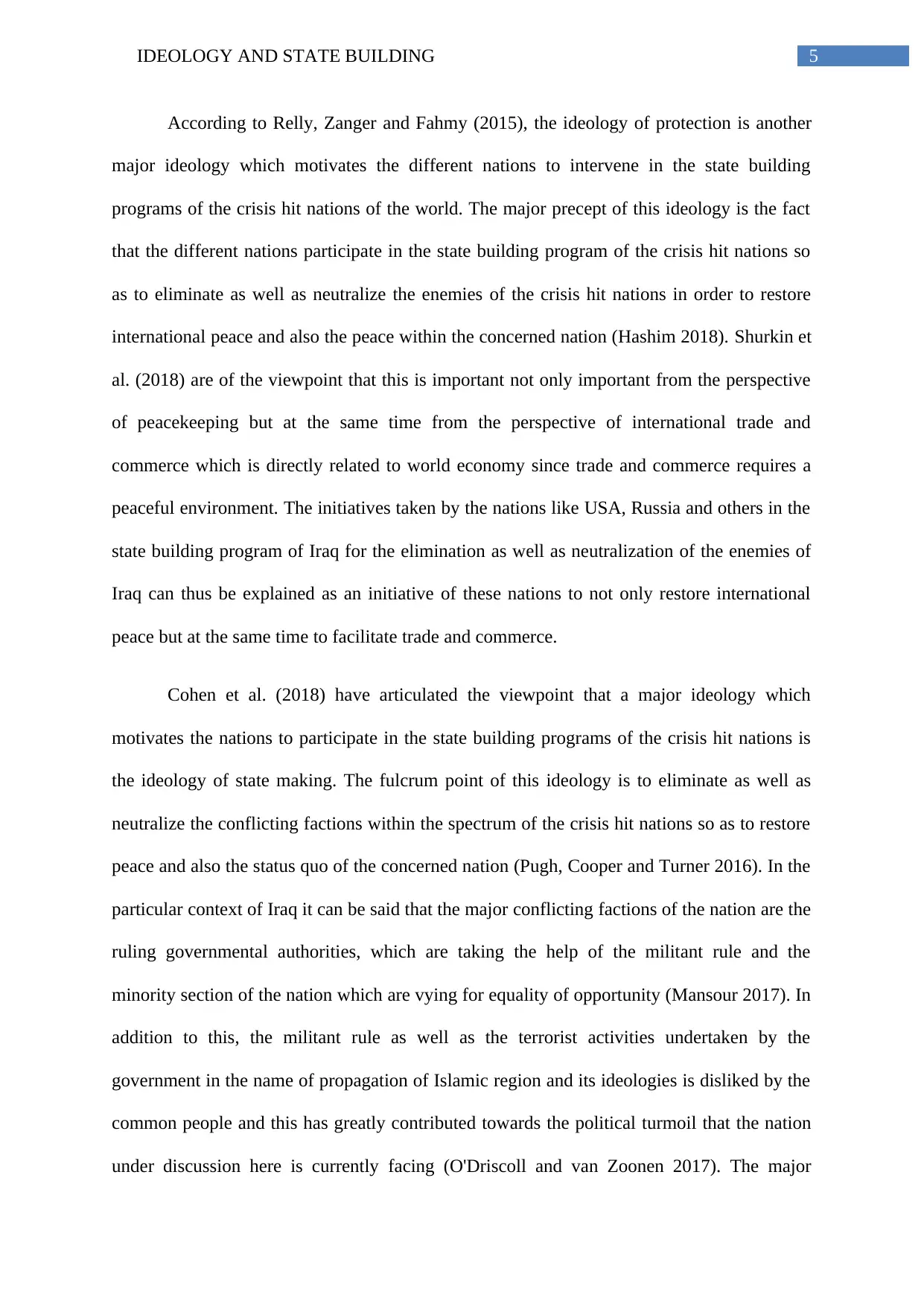
5IDEOLOGY AND STATE BUILDING
According to Relly, Zanger and Fahmy (2015), the ideology of protection is another
major ideology which motivates the different nations to intervene in the state building
programs of the crisis hit nations of the world. The major precept of this ideology is the fact
that the different nations participate in the state building program of the crisis hit nations so
as to eliminate as well as neutralize the enemies of the crisis hit nations in order to restore
international peace and also the peace within the concerned nation (Hashim 2018). Shurkin et
al. (2018) are of the viewpoint that this is important not only important from the perspective
of peacekeeping but at the same time from the perspective of international trade and
commerce which is directly related to world economy since trade and commerce requires a
peaceful environment. The initiatives taken by the nations like USA, Russia and others in the
state building program of Iraq for the elimination as well as neutralization of the enemies of
Iraq can thus be explained as an initiative of these nations to not only restore international
peace but at the same time to facilitate trade and commerce.
Cohen et al. (2018) have articulated the viewpoint that a major ideology which
motivates the nations to participate in the state building programs of the crisis hit nations is
the ideology of state making. The fulcrum point of this ideology is to eliminate as well as
neutralize the conflicting factions within the spectrum of the crisis hit nations so as to restore
peace and also the status quo of the concerned nation (Pugh, Cooper and Turner 2016). In the
particular context of Iraq it can be said that the major conflicting factions of the nation are the
ruling governmental authorities, which are taking the help of the militant rule and the
minority section of the nation which are vying for equality of opportunity (Mansour 2017). In
addition to this, the militant rule as well as the terrorist activities undertaken by the
government in the name of propagation of Islamic region and its ideologies is disliked by the
common people and this has greatly contributed towards the political turmoil that the nation
under discussion here is currently facing (O'Driscoll and van Zoonen 2017). The major
According to Relly, Zanger and Fahmy (2015), the ideology of protection is another
major ideology which motivates the different nations to intervene in the state building
programs of the crisis hit nations of the world. The major precept of this ideology is the fact
that the different nations participate in the state building program of the crisis hit nations so
as to eliminate as well as neutralize the enemies of the crisis hit nations in order to restore
international peace and also the peace within the concerned nation (Hashim 2018). Shurkin et
al. (2018) are of the viewpoint that this is important not only important from the perspective
of peacekeeping but at the same time from the perspective of international trade and
commerce which is directly related to world economy since trade and commerce requires a
peaceful environment. The initiatives taken by the nations like USA, Russia and others in the
state building program of Iraq for the elimination as well as neutralization of the enemies of
Iraq can thus be explained as an initiative of these nations to not only restore international
peace but at the same time to facilitate trade and commerce.
Cohen et al. (2018) have articulated the viewpoint that a major ideology which
motivates the nations to participate in the state building programs of the crisis hit nations is
the ideology of state making. The fulcrum point of this ideology is to eliminate as well as
neutralize the conflicting factions within the spectrum of the crisis hit nations so as to restore
peace and also the status quo of the concerned nation (Pugh, Cooper and Turner 2016). In the
particular context of Iraq it can be said that the major conflicting factions of the nation are the
ruling governmental authorities, which are taking the help of the militant rule and the
minority section of the nation which are vying for equality of opportunity (Mansour 2017). In
addition to this, the militant rule as well as the terrorist activities undertaken by the
government in the name of propagation of Islamic region and its ideologies is disliked by the
common people and this has greatly contributed towards the political turmoil that the nation
under discussion here is currently facing (O'Driscoll and van Zoonen 2017). The major
⊘ This is a preview!⊘
Do you want full access?
Subscribe today to unlock all pages.

Trusted by 1+ million students worldwide
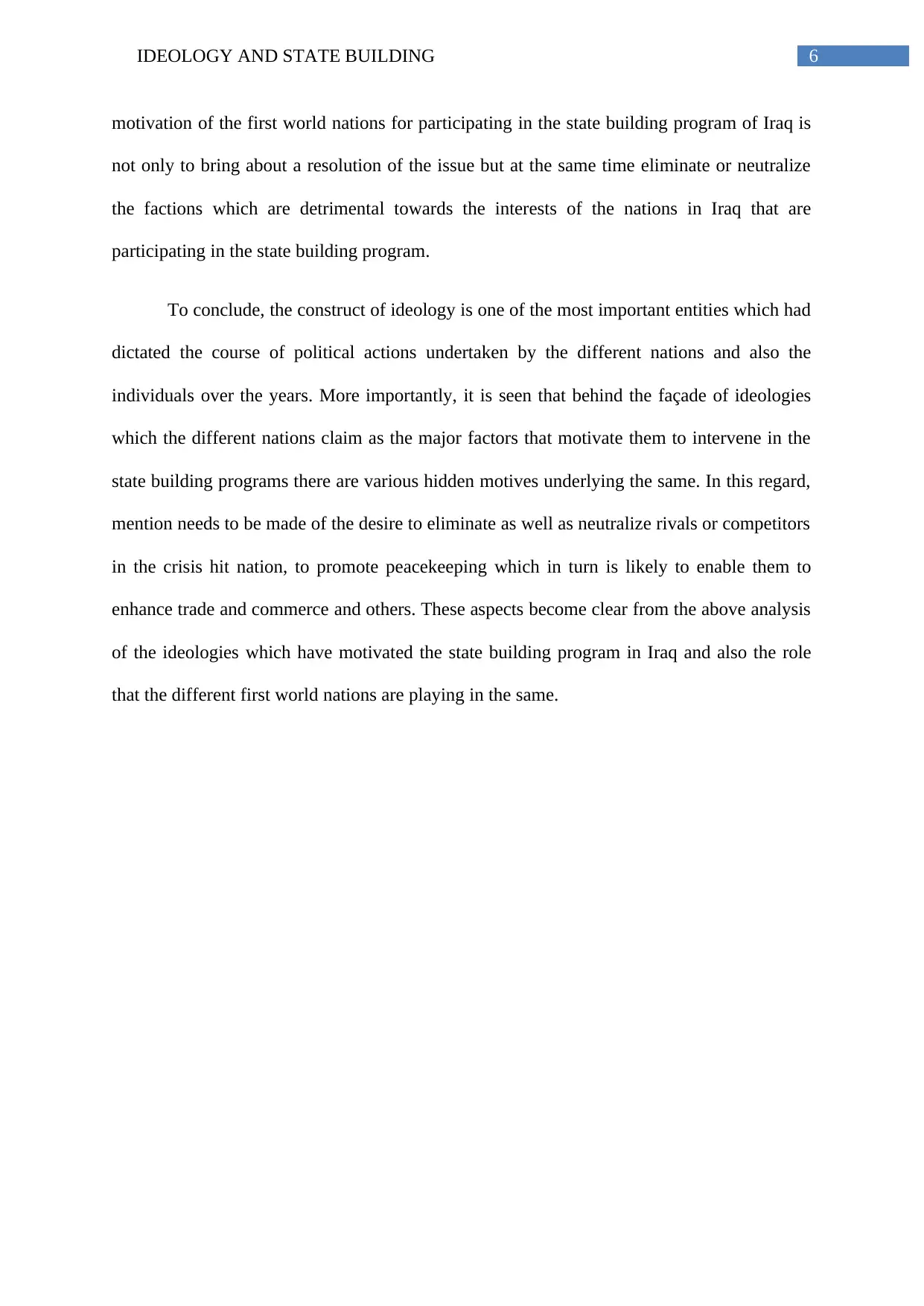
6IDEOLOGY AND STATE BUILDING
motivation of the first world nations for participating in the state building program of Iraq is
not only to bring about a resolution of the issue but at the same time eliminate or neutralize
the factions which are detrimental towards the interests of the nations in Iraq that are
participating in the state building program.
To conclude, the construct of ideology is one of the most important entities which had
dictated the course of political actions undertaken by the different nations and also the
individuals over the years. More importantly, it is seen that behind the façade of ideologies
which the different nations claim as the major factors that motivate them to intervene in the
state building programs there are various hidden motives underlying the same. In this regard,
mention needs to be made of the desire to eliminate as well as neutralize rivals or competitors
in the crisis hit nation, to promote peacekeeping which in turn is likely to enable them to
enhance trade and commerce and others. These aspects become clear from the above analysis
of the ideologies which have motivated the state building program in Iraq and also the role
that the different first world nations are playing in the same.
motivation of the first world nations for participating in the state building program of Iraq is
not only to bring about a resolution of the issue but at the same time eliminate or neutralize
the factions which are detrimental towards the interests of the nations in Iraq that are
participating in the state building program.
To conclude, the construct of ideology is one of the most important entities which had
dictated the course of political actions undertaken by the different nations and also the
individuals over the years. More importantly, it is seen that behind the façade of ideologies
which the different nations claim as the major factors that motivate them to intervene in the
state building programs there are various hidden motives underlying the same. In this regard,
mention needs to be made of the desire to eliminate as well as neutralize rivals or competitors
in the crisis hit nation, to promote peacekeeping which in turn is likely to enable them to
enhance trade and commerce and others. These aspects become clear from the above analysis
of the ideologies which have motivated the state building program in Iraq and also the role
that the different first world nations are playing in the same.
Paraphrase This Document
Need a fresh take? Get an instant paraphrase of this document with our AI Paraphraser
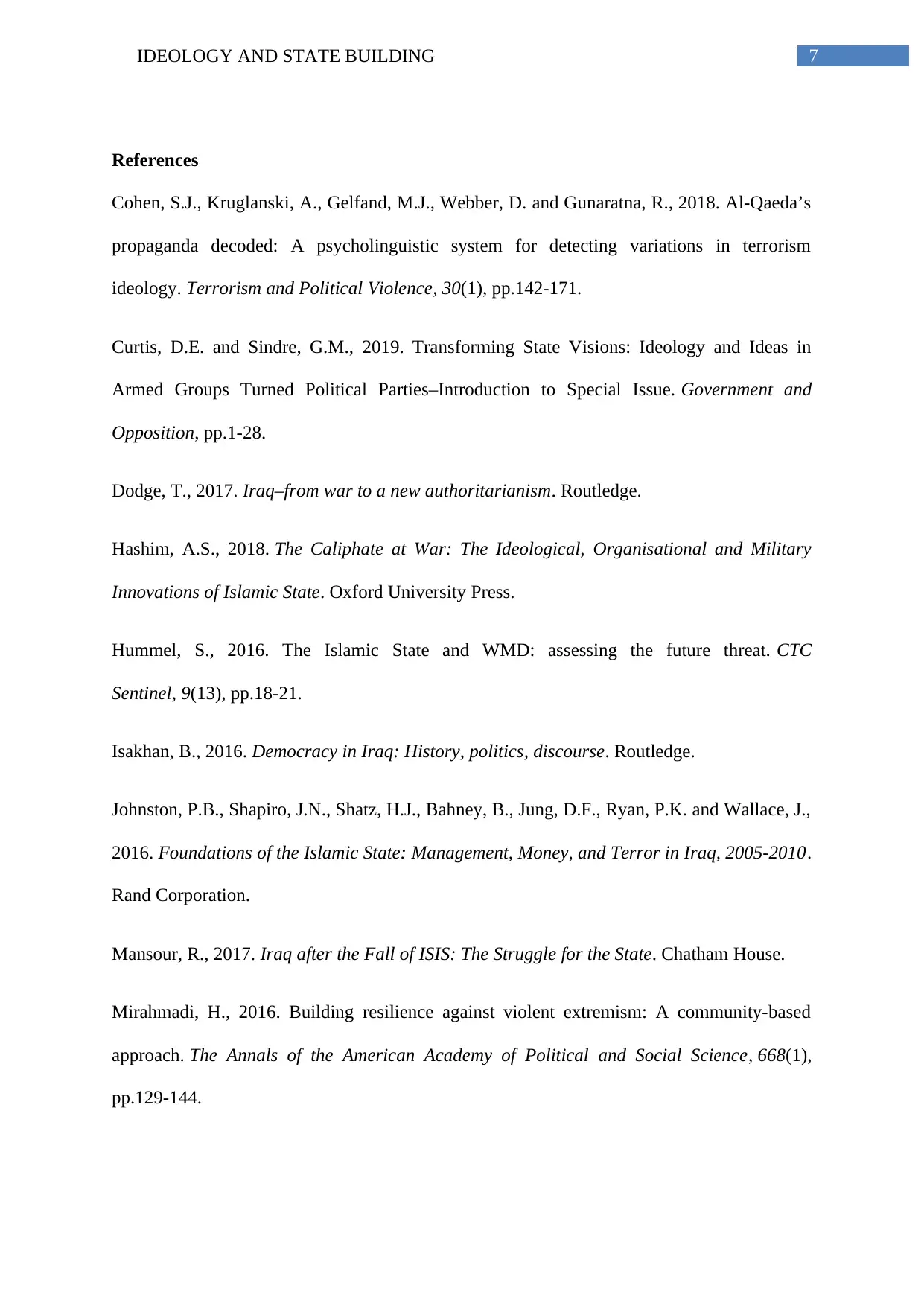
7IDEOLOGY AND STATE BUILDING
References
Cohen, S.J., Kruglanski, A., Gelfand, M.J., Webber, D. and Gunaratna, R., 2018. Al-Qaeda’s
propaganda decoded: A psycholinguistic system for detecting variations in terrorism
ideology. Terrorism and Political Violence, 30(1), pp.142-171.
Curtis, D.E. and Sindre, G.M., 2019. Transforming State Visions: Ideology and Ideas in
Armed Groups Turned Political Parties–Introduction to Special Issue. Government and
Opposition, pp.1-28.
Dodge, T., 2017. Iraq–from war to a new authoritarianism. Routledge.
Hashim, A.S., 2018. The Caliphate at War: The Ideological, Organisational and Military
Innovations of Islamic State. Oxford University Press.
Hummel, S., 2016. The Islamic State and WMD: assessing the future threat. CTC
Sentinel, 9(13), pp.18-21.
Isakhan, B., 2016. Democracy in Iraq: History, politics, discourse. Routledge.
Johnston, P.B., Shapiro, J.N., Shatz, H.J., Bahney, B., Jung, D.F., Ryan, P.K. and Wallace, J.,
2016. Foundations of the Islamic State: Management, Money, and Terror in Iraq, 2005-2010.
Rand Corporation.
Mansour, R., 2017. Iraq after the Fall of ISIS: The Struggle for the State. Chatham House.
Mirahmadi, H., 2016. Building resilience against violent extremism: A community-based
approach. The Annals of the American Academy of Political and Social Science, 668(1),
pp.129-144.
References
Cohen, S.J., Kruglanski, A., Gelfand, M.J., Webber, D. and Gunaratna, R., 2018. Al-Qaeda’s
propaganda decoded: A psycholinguistic system for detecting variations in terrorism
ideology. Terrorism and Political Violence, 30(1), pp.142-171.
Curtis, D.E. and Sindre, G.M., 2019. Transforming State Visions: Ideology and Ideas in
Armed Groups Turned Political Parties–Introduction to Special Issue. Government and
Opposition, pp.1-28.
Dodge, T., 2017. Iraq–from war to a new authoritarianism. Routledge.
Hashim, A.S., 2018. The Caliphate at War: The Ideological, Organisational and Military
Innovations of Islamic State. Oxford University Press.
Hummel, S., 2016. The Islamic State and WMD: assessing the future threat. CTC
Sentinel, 9(13), pp.18-21.
Isakhan, B., 2016. Democracy in Iraq: History, politics, discourse. Routledge.
Johnston, P.B., Shapiro, J.N., Shatz, H.J., Bahney, B., Jung, D.F., Ryan, P.K. and Wallace, J.,
2016. Foundations of the Islamic State: Management, Money, and Terror in Iraq, 2005-2010.
Rand Corporation.
Mansour, R., 2017. Iraq after the Fall of ISIS: The Struggle for the State. Chatham House.
Mirahmadi, H., 2016. Building resilience against violent extremism: A community-based
approach. The Annals of the American Academy of Political and Social Science, 668(1),
pp.129-144.
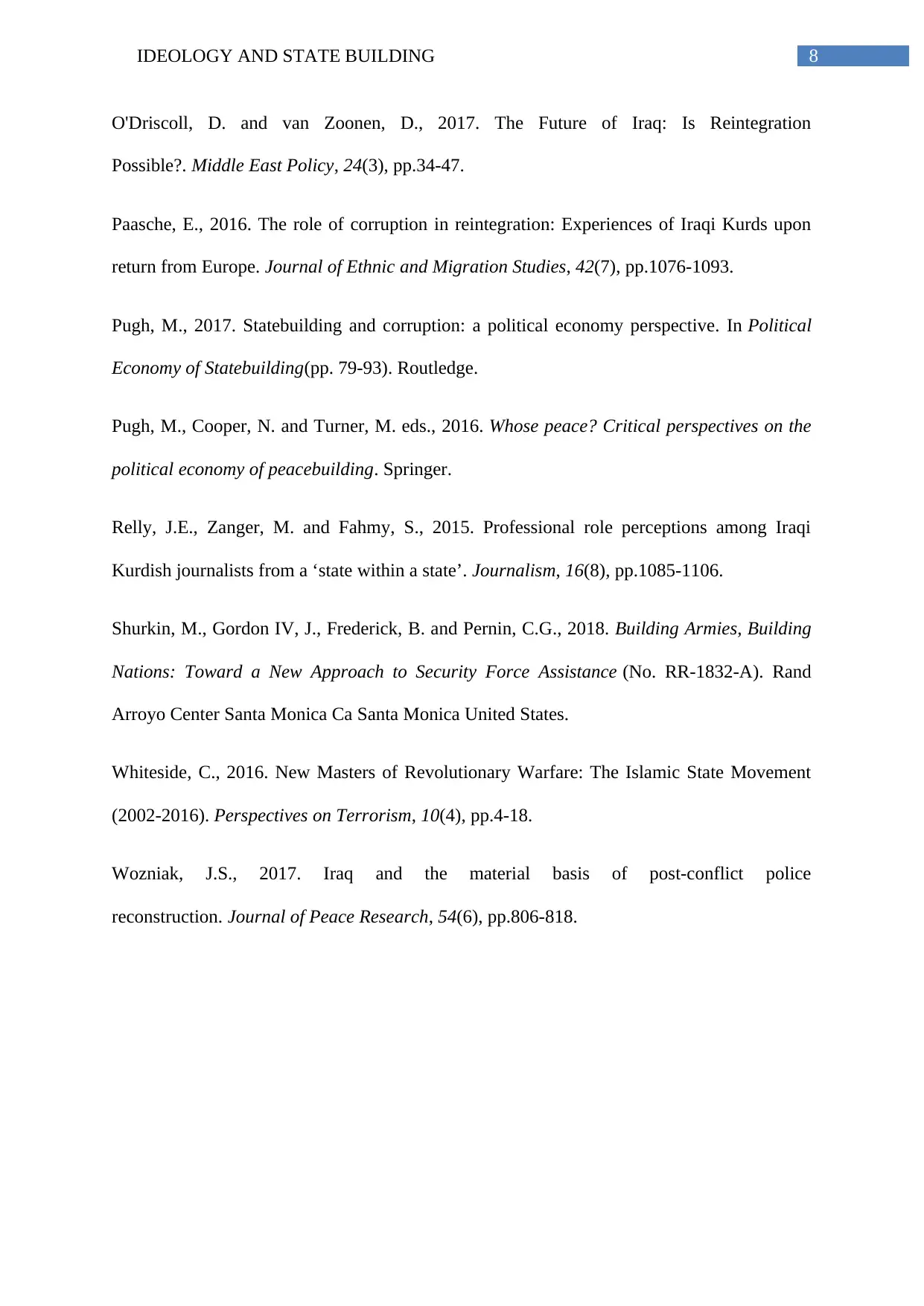
8IDEOLOGY AND STATE BUILDING
O'Driscoll, D. and van Zoonen, D., 2017. The Future of Iraq: Is Reintegration
Possible?. Middle East Policy, 24(3), pp.34-47.
Paasche, E., 2016. The role of corruption in reintegration: Experiences of Iraqi Kurds upon
return from Europe. Journal of Ethnic and Migration Studies, 42(7), pp.1076-1093.
Pugh, M., 2017. Statebuilding and corruption: a political economy perspective. In Political
Economy of Statebuilding(pp. 79-93). Routledge.
Pugh, M., Cooper, N. and Turner, M. eds., 2016. Whose peace? Critical perspectives on the
political economy of peacebuilding. Springer.
Relly, J.E., Zanger, M. and Fahmy, S., 2015. Professional role perceptions among Iraqi
Kurdish journalists from a ‘state within a state’. Journalism, 16(8), pp.1085-1106.
Shurkin, M., Gordon IV, J., Frederick, B. and Pernin, C.G., 2018. Building Armies, Building
Nations: Toward a New Approach to Security Force Assistance (No. RR-1832-A). Rand
Arroyo Center Santa Monica Ca Santa Monica United States.
Whiteside, C., 2016. New Masters of Revolutionary Warfare: The Islamic State Movement
(2002-2016). Perspectives on Terrorism, 10(4), pp.4-18.
Wozniak, J.S., 2017. Iraq and the material basis of post-conflict police
reconstruction. Journal of Peace Research, 54(6), pp.806-818.
O'Driscoll, D. and van Zoonen, D., 2017. The Future of Iraq: Is Reintegration
Possible?. Middle East Policy, 24(3), pp.34-47.
Paasche, E., 2016. The role of corruption in reintegration: Experiences of Iraqi Kurds upon
return from Europe. Journal of Ethnic and Migration Studies, 42(7), pp.1076-1093.
Pugh, M., 2017. Statebuilding and corruption: a political economy perspective. In Political
Economy of Statebuilding(pp. 79-93). Routledge.
Pugh, M., Cooper, N. and Turner, M. eds., 2016. Whose peace? Critical perspectives on the
political economy of peacebuilding. Springer.
Relly, J.E., Zanger, M. and Fahmy, S., 2015. Professional role perceptions among Iraqi
Kurdish journalists from a ‘state within a state’. Journalism, 16(8), pp.1085-1106.
Shurkin, M., Gordon IV, J., Frederick, B. and Pernin, C.G., 2018. Building Armies, Building
Nations: Toward a New Approach to Security Force Assistance (No. RR-1832-A). Rand
Arroyo Center Santa Monica Ca Santa Monica United States.
Whiteside, C., 2016. New Masters of Revolutionary Warfare: The Islamic State Movement
(2002-2016). Perspectives on Terrorism, 10(4), pp.4-18.
Wozniak, J.S., 2017. Iraq and the material basis of post-conflict police
reconstruction. Journal of Peace Research, 54(6), pp.806-818.
⊘ This is a preview!⊘
Do you want full access?
Subscribe today to unlock all pages.

Trusted by 1+ million students worldwide
1 out of 9
Related Documents
Your All-in-One AI-Powered Toolkit for Academic Success.
+13062052269
info@desklib.com
Available 24*7 on WhatsApp / Email
![[object Object]](/_next/static/media/star-bottom.7253800d.svg)
Unlock your academic potential
Copyright © 2020–2025 A2Z Services. All Rights Reserved. Developed and managed by ZUCOL.





